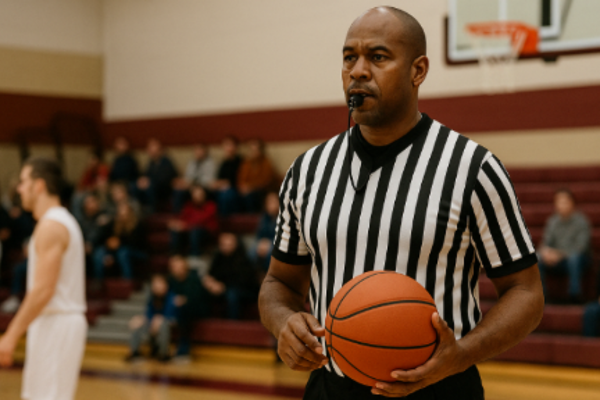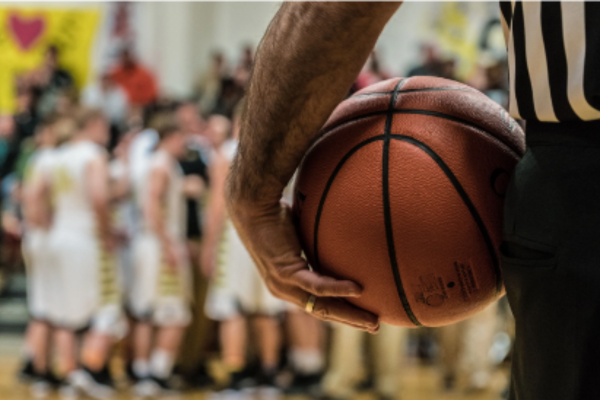Becoming a Basketball referee is more than just a side hustle—it’s a great way to stay connected to the sport you love, give back to your community, and even develop a career. Whether you’re a former player, a coach, or just a passionate fan, putting on the stripes can offer a whole new perspective on the game.
From YMCA gyms to college arenas, I’ve experienced nearly every level of officiating. These tips come from years of experience and are the things I wish someone had told me when I started. So if you’re considering becoming a baketball referee, this guide is for you.

1. Join the NASO—even if you’re only officiating youth games
One of the smartest moves you can make early on is joining the National Association of Sports Officials (NASO). It provides valuable benefits, including liability insurance, rulebook access, training resources, and a supportive network of fellow referees. Even if you’re just working local youth games, being part of a national body gives you credibility and protection.
In addition, you’ll want to connect with a local referees association, which will help you find games, receive evaluations, and grow your skills. The easiest way to find one? Attend a varsity game and talk to the officials—they’re often happy to help newcomers get started.
2. Study the rules—both official and league-specific
It’s not enough to just know the general rules of basketball. Every league has its own unique adaptations, especially at the youth level. For example, some leagues don’t allow double-teaming, full-court presses, or enforce time-based violations like the 5-second inbound rule.
Before you ever blow your whistle in a live game, familiarize yourself with the league’s custom rules. Print them, study them, and run through potential game scenarios so you’re not caught off guard during crucial moments.
3. Prepare mentally for upset coaches
Coaches are passionate—and sometimes that passion spills over into frustration. I once had a coach blow up with just seconds left in a one-point game. I issued a bench warning, and the coach reacted by throwing a clipboard and yelling profanity, which earned a technical foul and gave the opposing team free throws to seal the game.
Remain calm and professional, no matter how emotional the coach gets. Your job is to keep the game fair, safe, and in control—not to argue or take things personally.
4. Parents can be tougher than coaches—stay alert
Referees are often right next to the stands, and unfortunately, some parents don’t know where the line is. In one high school game, I called an obvious foul on a player, and the parent stormed out of the bleachers and tried to confront me physically.
Thanks to the police presence at the venue, the situation was handled quickly. But it’s a reminder that you always need to be aware of your surroundings, especially during high-stakes or emotional games. If a situation escalates, stop the game and involve security or game staff immediately.
5. Accept that you’ll make mistakes—and learn from them
Even the most experienced officials occasionally get calls wrong. Once, I called a foul because I was sure I heard a slap on the arm. But video replay showed the defender had cleanly hit the ball. That mistake changed the game’s outcome.
As a referee, you won’t be perfect—and that’s okay. The important part is how you handle it. If you know you made a mistake, own it, learn from it, and improve for the next game.
6. Referee pay improves as you advance
Refereeing starts off modestly, but the pay can increase significantly with experience and higher-level games.
- Youth leagues (YMCA/Rec): ~$10/game
- High school: $75–$100 per night (JV + Varsity combo games)
- College: $500–$1,000 per game
- Top-tier college/major conferences: Up to $3,000 per game
- NBA referees: $150,000–$550,000+ per year
You’ll also get compensated for travel in many cases, especially at the high school and college levels. If you stick with it and hone your craft, officiating can become a serious income source or even a full-time job.
7. Most leagues require officiating exams and certifications
Before officiating, you’ll usually need to pass a test to prove your understanding of basketball rules and referee mechanics. This varies by level:
- YMCA/Rec Leagues: May simply observe you in early games
- High School: Written exams through local referee associations
- College: Independent certification and continuing education required
Even after certification, ongoing training and testing may be needed to keep your eligibility. Treat officiating like a profession, and you’ll continue to grow and get better.
8. The more games you work, the better you’ll get
Your first few games might feel awkward—and that’s normal. My first foul call looked more like a dance move than an actual signal. Over time, though, I gained confidence and fluency in my movements and decisions.
Refereeing is a skill that improves with repetition. Work as many games as possible. Even volunteering for rec league games or 3-on-3 tournaments can help you build rhythm and develop court awareness.
The most successful referees are the ones who say “yes” to every opportunity.
9. Invest in comfortable gear and the right equipment
Wearing cheap or uncomfortable referee gear is a quick way to distract yourself and reduce your performance. I used to wear a basic ref shirt that soaked in sweat and irritated my skin. Once I upgraded to a lightweight, moisture-wicking shirt, my comfort and focus improved dramatically.
Here’s what you should always bring:
- Two whistles (one as a backup)
- Shirt clip-style whistle (not a lanyard)
- Referee notepad for fouls and timeouts
- Ball pressure gauge to ensure regulation equipment
- Black athletic shoes and pants for comfort and professionalism
Investing in proper equipment will help you perform at your best, especially during longer or high-pressure games.
Table of Contents
Frequently Asked Questions (FAQs)

How do I get started as a basketball referee?
Start by joining a local officiating association. They’ll help you through testing, training, and game assignments.
What’s the minimum age to referee?
Many youth and rec leagues allow referees as young as 14 to 16 years old. For high school and above, you’ll usually need to be 18 or older.
Can I ref even if I’ve never played basketball?
Yes! While playing experience helps, it’s not required. The most important skills are rule knowledge, confidence, communication, and staying calm under pressure.
Can refereeing become a full-time career?
Absolutely. At the college and professional levels, officiating can be a high-paying, full-time career. But it requires years of experience, strong performance, and ongoing training.
What is the meaning of referee signals in basketball?
Referee signals are standardized hand and arm movements used to communicate calls like fouls, violations, and timeouts. Learning their meaning helps players, coaches, and fans understand the game clearly and ensure consistent officiating.
What should I do if a coach or parent gets aggressive?
Stop the game and follow your league’s protocol. Always prioritize your safety. If necessary, ask for security or remove the person from the venue.
Conclusion: Why Refereeing Is Worth the Whistle

Becoming a basketball referee isn’t easy. You’ll face criticism, make tough calls, and be tested mentally and emotionally. But you’ll also learn leadership, build confidence, and stay deeply connected to the game.
Whether you want to earn extra money, give back to the community, or pursue a high-level officiating career, the journey starts with your first game. Show up. Learn. Grow. And let the love of the game guide you.
Find out more about getting started with basketball here!
What’s Next?
Ready to hit the court? Reach out to your local officiating association, sign up for training, or volunteer for a youth league game. Your first step is all it takes to start your officiating journey. Whether for extra income or as a career, it all begins with showing up and learning the ropes.
Grab your stripes and make your first call—the game needs great refs like you!
